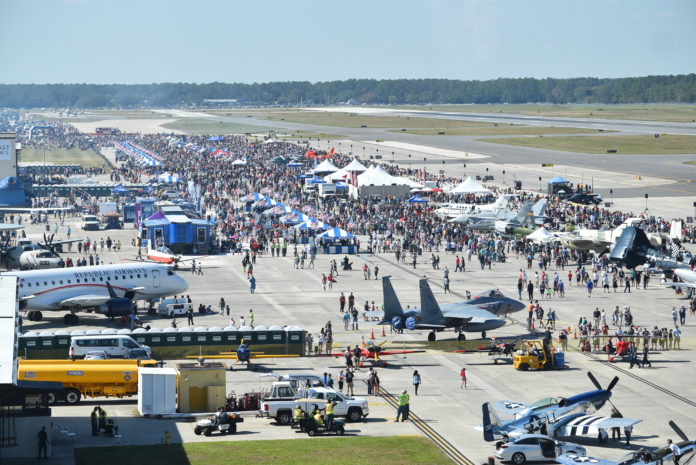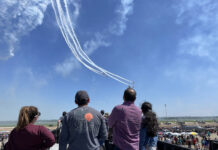We will continue to inspire, entertain and fly again.
Society, government, healthcare, the economy, our lifestyles and more will change. No one knows exactly what will come, but crisis moments also present opportunity, especially for events like ours.
Dr. Christine Van Winkle, Chair of the Travel and Tourism Research Association, feels confident that events will be embraced in the aftermath of the COVID-19 crisis. She recently wrote, “This pandemic, like others, will eventually taper off. When that happens, festivals and events will be an important part of recovery.”
As an example, Christine says, “After SARS took its toll on Toronto in 2003, a SARS benefit concert featuring the Rolling Stones, Rush and other high-profile artists helped to bring visitors back to the city.” She explains, “Festivals and events contribute to our sense of place and our sense of community, both of which will need fostering following the COVID-19 pandemic.”
Van Winkle feels the public will be supportive when this is over, pointing out, “We have a lot to gain from showing acts of support towards festival and event organizers. We can also bear in mind the power of celebrating with friends, family and community at future in-person gatherings.”
History and research back her, “Events play an important role in community life and research has repeatedly shown that attending festivals and community events has many benefits. In a study examining the social impact of events, my colleagues and I found that attending festivals is related to a sense of emotional connection. By coming together to share in a common experience, we build stronger, more resilient communities.”
Your ticket holders may be disappointed by a cancellation, some will want refunds, but a good number of them will want to support your event in the aftermath. Van Winkle says many will, “…consider donating, volunteering or reaching out to the organization to express support and signal readiness to attend events once circumstances change. These acts of giving can also improve our well-being.”
Mary Frances Berry, professor of American Social Thought at the University of Pennsylvania, agrees with Van Winkle saying, “After the disastrous 1918-19 Spanish flu and the end of World War I, many Americans sought entertainment. Probably, given past behavior, when this pandemic is over, human beings will respond with the same sense of relief and a search for community, relief from stress and pleasure.”
Alexandra Lange, architecture critic at Curbed says, “Society might come out of the pandemic valuing big spaces even more, not only as the backdrop to major events and active uses, but as an opportunity to be together visually. After this is all over, I would love to see more public investment in open, accessible, all-weather places to gather, even after we no longer need to stay six feet apart.”
PUBLIC HEALTH / EXPECT MORE REGULATION
After 9/11, the world focused on counterterrorism. After COVID-19, attention may shift to public health. If so, the world and your community will not be the same in the aftermath. Our industry will have to make adjustments, it will not be business as usual. Pandemics can bring permanent social change. People, businesses, and institutions have been quick to adopt or call for practices that they might once have dragged their heels on. As long as the virus persists somewhere, the public is painfully aware that there’s a chance that one infected person could reignite things. It’s likely, then, that the crisis will be a part of life for at least a year, if not much longer. Health authorities will work with that in mind, as well, and your attendees will want it. A lot of the measures implemented during the crisis will stick. Event cleanliness and social distancing will still be a factor. Making more room in VIP areas, keeping restrooms cleaner, emptying garbage and recycling containers more often, providing sanitizers, as well as better food preparation and self-serve condiment areas will be bigger priorities for ticket buyers. The pandemic may have changed our way of looking at ourselves.
NEW HEROES
The crisis has brought a new kind of patriotism, according to Mark Lawrence Schrad, associate professor of political science Villanova University near Philadelphia. He says, “America has long equated patriotism with the armed forces. But you can’t shoot a virus. Those on the frontlines against coronavirus aren’t conscripts, mercenaries or enlisted men; they are our doctors, nurses, pharmacists, teachers, caregivers, store clerks, utility workers, small-business owners and employees. When all is said and done, perhaps we will recognize their sacrifice as true patriotism, saluting our doctors and nurses.”
A “Thank you for your service,” as we now do for military veterans at our air shows might also include the people who sacrifice their health and their lives for ours. “Patriotism will be as much about cultivating the health and life of your community,” according to Lawrence.
THE WEB AND SOCIAL PAGES WILL DOMINATE
“COVID-19 will sweep away many of the barriers to moving more of our lives online,” says Katherine Mangu-Ward editor-in-chief of Reason Magazine. “It will be near-impossible to put that genie back in the bottle in the fall, with many families finding that they prefer full or partial homeschooling or online homework. For many college students, returning to an expensive dorm room on a depopulated campus will not be appealing, forcing massive changes in a sector that has been ripe for innovation for a long time. And while not every job can be done remotely, many people are learning that the difference between having to put on a tie and commute for an hour or working efficiently at home was always just the ability to download one or two apps plus permission from their boss.”
Moving even more of your air show content to social pages and the web to sell and promote the event will be even more important.
THE ECONOMIC AFTERSHOCK
As of this writing, Jim Breen and the Air Show Network has lost ten shows. Having gone through the aftermath of 9/11, the 2008 financial crisis and Sequestration, he is optimistic saying, “We’re cutting our losses, but I think the pent-up demand will be just like 2014.”
Bryan Lilley of B. Lilley Productions, who produces five shows and comes from a background of event management, is also optimistic: “People are going to be hungry and want to get out, but the rules are going to change.” While he says they’re still exploring options, he thinks, “Attendees will want more space and we have to be crowd sensitive by limiting tickets, putting more emphasis on advance sales and less dependence on gate sales. We need to be pro-active implementing space and health concerns. The media are likely to make an issue of this, so we’ve got to be prepared. For example, we may need a re-think buses from parking lots, etc.”
Lilley concludes, “Do not base your financial planning on wishful thinking. You need strong, rational thinking in the coming year. Base it on strong theory and strong rationale. Do your homework and stay connected to developing trends.”
Kevin Walsh is another optimistic event organizer, who adds, “It’s such a bizarre thing we’ve been through. I’m optimistic by nature, but — even stepping back — I think any special event — baseball, hockey whatever — will see huge engagement for months after. People will want to do something fun in the community. I harken back to the days of 2009 and the great recession. It was one of the best years for us because we were affordable. I see a resurgence of the ‘Stay-cation.’ It’s almost a perfect storm for community events. Money will be limited and staying closer to home will be more economical. We’re planning ticket specials we’ve never done before for Thunder Over Michigan to keep it affordable. So, I think we’re going to see record numbers as people reengage in their community and folks look for more affordable options because their wallets are lighter.”
Walsh agrees that it won’t be business as usual. “Security was a big concern in the past, ramping up year after year, but security lines might be something that people won’t appreciate coming out of this. We’ll need the screening and — to make it work — we’ll need more space to do it in. We’ve also reduced capacity in our tents and we’re giving the public a lot more space allowing ticket holders the ability to spread out.”
Walsh feels sponsorship dollars won’t disappear and suggests, “Watch other industries and brands to see what they’re doing. Some of these businesses are doing well through this making for potential sponsorships. Hardware stores, as an example, grocery stores and others. One local store here sold $39,000 dollars in paint alone.”
One person with experience in Olympics sponsorship suggested cancellations and postponements provide sponsors with an unexpected bit of savings. This allows them to hold off on spending those dollars at a time when there would be little point in marketing, anyway, with the economy in a tailspin and consumers suddenly showing extreme caution. Coming out of this, they’ll want to spend those dollars. Air show sales teams will have to sharpen their pitches, as it will be a very competitive market.
The cost of getting to this point has been enormous, but remember the public want and need the social connection and your sponsors will want to reach them to overcome their losses when we come out of this. Airshows will be a big part of the recovery as there is no other event as exciting, inspiring and entertaining.








